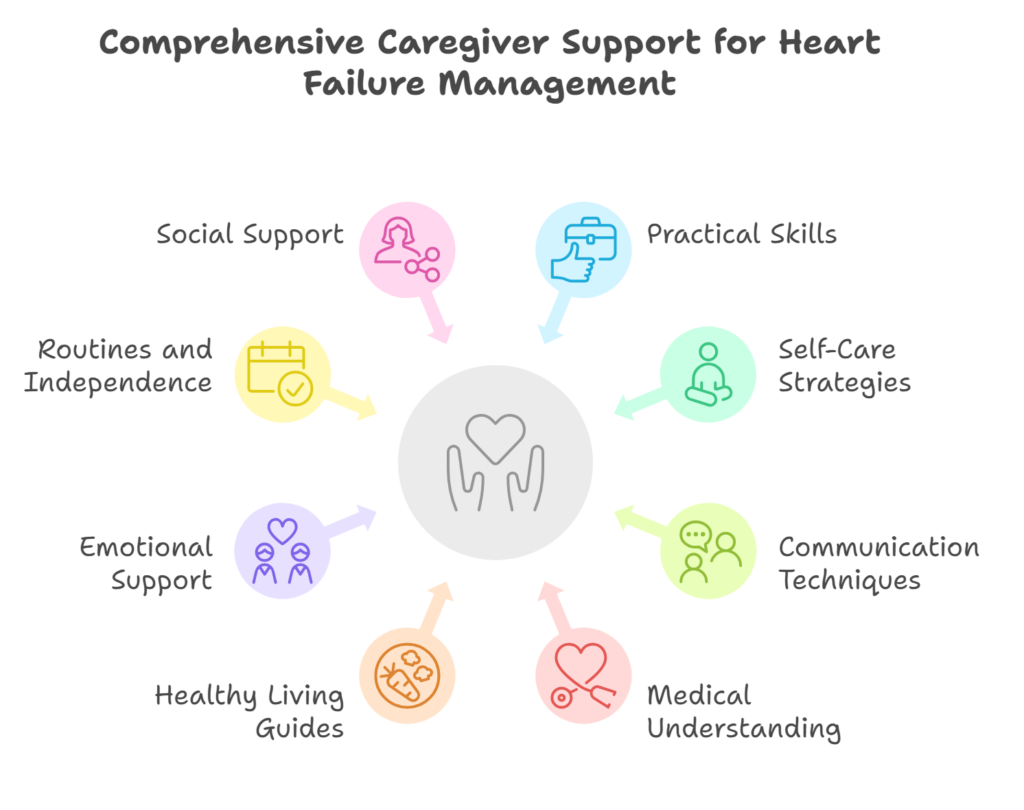
Supporting Your Loved One: How Caregivers Can Help LVAD Patients Thrive
Caregivers can play a crucial role in helping LVAD patients thrive by providing support, encouragement, and assistance while also prioritizing their own well-being. Here’s how caregivers can contribute to an LVAD patient’s journey to recovery and help them achieve their best:
Caring for a loved one with an LVAD (Left Ventricular Assist Device) is a journey that brings both challenges and rewards. As a caregiver, you play a critical role in helping your loved one recover and live their best life. While it’s natural to focus on the patient’s needs, remember that your own well-being is also essential to provide the best care. Here’s how you can support your loved one while taking care of yourself:
- Practical Assistance & Encouraging Independence
- In the initial weeks after surgery, your loved one will need help with daily activities. This may include cleaning the driveline site and managing medical appointments. Providing this hands-on help allows the patient to focus on healing and recovery.
- As your loved one feels better, encourage them to regain independence. Let them do what they can safely manage by themselves. This helps them regain a sense of control and gives you more time for yourself and other responsibilities.
- Emotional Support & Understanding
- Caregiving can bring a mix of emotions. You might feel grateful for more time with your loved one, but also experience stress, fatigue, resentment, and frustration. It’s important to acknowledge and prepare for these feelings.
- Understand that your loved one’s mood and behavior may be affected by their condition, not their feelings toward you. They may be in pain, discomfort, or feeling stressed.
- Advocacy & Engagement
- Be an active participant in your loved one’s care. Attend doctor’s visits, build a good relationship with the LVAD team, and learn as much as you can about how the LVAD works. This will help you advocate for your loved one’s needs and understand their care plan.
- Don’t hesitate to talk with staff at other locations, like your local energy company, local clinics, and doctors’ offices, that might not be familiar with the LVAD. Their services (or lack of services) could affect you in an emergency.
- Maintaining Routines
- Establishing a daily routine can help you stay organized and focused, which provides stability for both you and your loved one. Initially, it may be helpful to write down your routine to keep you on track.
- Focusing on the Big Picture
- Remind yourself of the reasons your loved one chose to get an LVAD. Accepting that life has changed can help you prepare for the new normal. This can be motivating for both you and your loved one.
- Prioritize Your Self-Care
- You can provide the best care when you take care of yourself too.
- Make sure to follow a balanced diet, get regular physical activity, keep up with doctor’s appointments, and try to get a good night’s rest.
- Give yourself time and space to vent your emotions. Engage in hobbies and activities that you enjoy.
- Seeking Support
- You don’t have to go through this alone.
- Arrange for backup caregivers.
- Involve family members in caregiving.
- Connect with local or online support groups for LVAD caregivers.
- Utilize online forums like the Caregiver Forum on Facebook.
- Maintain meaningful relationships, and plan activities outside of the house with friends and family.
- Don’t be afraid to ask for help from friends and family. Many people are happy to assist with errands, meals, or transportation to appointments.
- Available Resources
- Charting Your Course Booklets: These booklets provide structured support, self-care tips, and problem-solving resources for caregivers of people living with LVADs.
- Expert Sessions: Access brief videos with a clinical health psychologist who teaches about stress and coping.
- MyLVAD.com: This website offers a community forum, educational materials, and other resources for LVAD recipients and caregivers.
- Additional Resources: Explore the many resources from organizations such as the American Heart Association, the Centers for Disease Control and Prevention, and the Family Caregiver Alliance to help manage stress and care for yourself and your loved one.
By focusing on these key areas and utilizing available resources, you can help your loved one feel empowered and motivated on their recovery journey, while also taking care of your own well-being.

